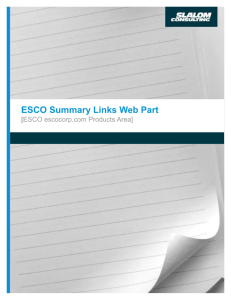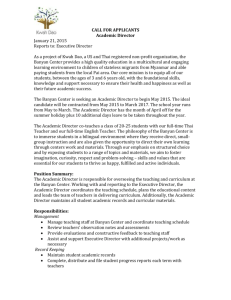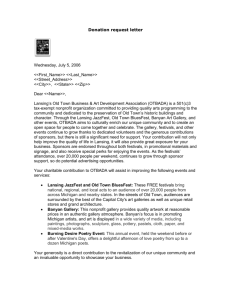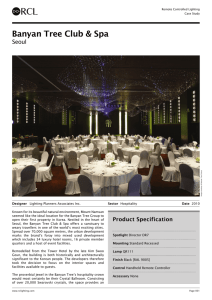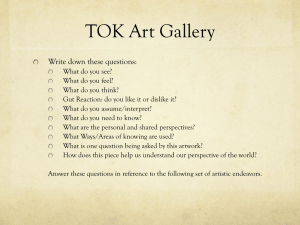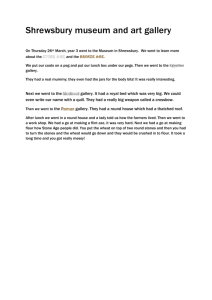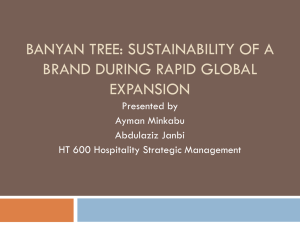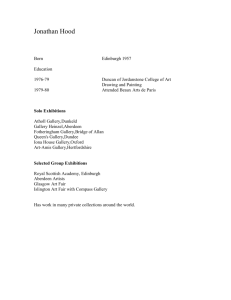Banyan Tree Gallery – “reTailinG WiTh a Difference” a responsiBle
advertisement
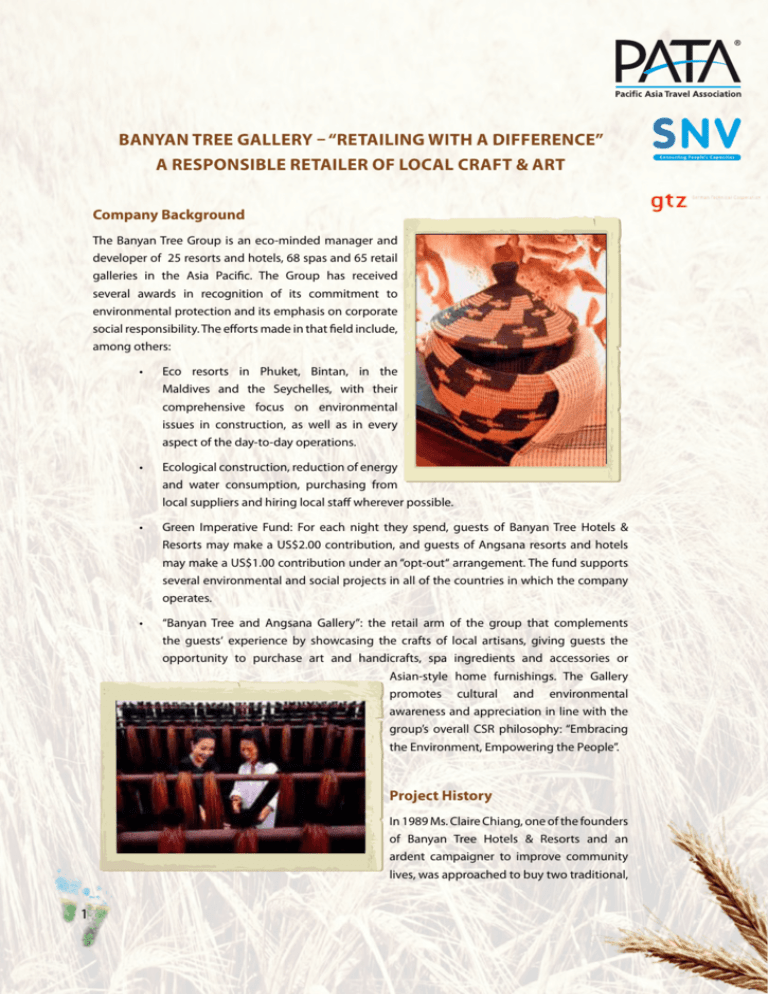
Banyan Tree Gallery – “Retailing With A Difference” A Responsible Retailer of Local Craft & Art Company Background The Banyan Tree Group is an eco-minded manager and developer of 25 resorts and hotels, 68 spas and 65 retail galleries in the Asia Pacific. The Group has received several awards in recognition of its commitment to environmental protection and its emphasis on corporate social responsibility. The efforts made in that field include, among others: • Eco resorts in Phuket, Bintan, in the Maldives and the Seychelles, with their comprehensive focus on environmental issues in construction, as well as in every aspect of the day-to-day operations. • Ecological construction, reduction of energy and water consumption, purchasing from local suppliers and hiring local staff wherever possible. • Green Imperative Fund: For each night they spend, guests of Banyan Tree Hotels & Resorts may make a US$2.00 contribution, and guests of Angsana resorts and hotels may make a US$1.00 contribution under an “opt-out“ arrangement. The fund supports several environmental and social projects in all of the countries in which the company operates. • “Banyan Tree and Angsana Gallery”: the retail arm of the group that complements the guests‘ experience by showcasing the crafts of local artisans, giving guests the opportunity to purchase art and handicrafts, spa ingredients and accessories or Asian-style home furnishings. The Gallery promotes cultural and environmental awareness and appreciation in line with the group’s overall CSR philosophy: “Embracing the Environment, Empowering the People”. Project History In 1989 Ms. Claire Chiang, one of the founders of Banyan Tree Hotels & Resorts and an ardent campaigner to improve community lives, was approached to buy two traditional, 1 triangular shaped “maun” cushions produced by community cooperatives in Yasathorn, eastern Thailand. Instead, she ordered 500 maun cushions and other traditional Thai crafts for the interiors of the Laguna Phuket resort. The cooperative became the first project of the Banyan Tree Gallery, which opened five years later in the Laguna Phuket Resort. The craftswomen could work from home while looking after their children while some of the proceeds from the sale of the cushions in the gallery were used to build Santhitham Vidhayakhom School. The project was designed to support the communities by connecting directly with the village cooperatives and cutting out the commercial middlemen who would diminish the people’s income. Driven by culture, entrepreneurship in the social sector and people networks, and founded on sound sustainable principles, the business expanded quickly, and there are now over 60 Banyan Tree Galleries and Angsana Galleries. Ms. Chiang is now managing director of Banyan Tree Gallery and Angsana Gallery and senior vice president of Banyan Tree. Concept Banyan Tree Gallery takes responsibility for the local communities in the countries in which the company operates by helping them to generate an adequate income, while preserving their cultural heritage and livelihoods. The communities are not dependent on donations, nor do they have to leave their villages to seek employment in the tourism sector. Families can stay 2 together and continue their traditional way of living. Banyan Tree Gallery acts as a marketing platform to create cultural and green awareness and is committed to supporting indigenous artistry, the livelihoods of village artisans and environmental conservation. Many of the Gallery products are eco-friendly, using natural or recycled materials. The Gallery has a wide network of village producers and project partners in several Asian countries. Working directly with community cooperatives and community producers may have been practiced by other retailers before, but taking it to a global network and instilling the education and awareness aspect was something completely new in the hotel business. By partnering with local community producers, Banyan Tree Gallery has led the way for Banyan Tree Hotels and Resorts to continually push for more socially and environmentally responsible sourcing and purchasing. Banyan Tree Gallery has developed the “Ethos of a socially responsible tourism retailer”: 3 • Sustaining Village Development Banyan Tree Gallery works closely with village cooperatives and non-profit craft marketing agents to provide gainful employment and to help sustain ethnic craft skills. • Conserving Natural & Cultural Resources A wide range of eco-friendly products has been dteveloped through recycling and the use of indigenous natural materials. • Showcasing Ethnic Crafts and Culture Retail items are accompanied by a detailed write-up of the craft, its creator and its origins to promote Asia’s rich heritage and culture. • Educating & Motivating Stakeholders Market knowledge, such as knowledge about trends and customer preferences, is shared with the cottage craft producers during workshops and visits to enhance the marketability and sustainability of the crafts. Implementation Process and Products Since its inception, Banyan Tree Gallery has worked closely with over 40 different village cooperatives, non-profit craft marketing and community groups from all over Asia. Through visits and workshops in the communities, Banyan Tree Gallery actively enhances craft development. In the workshops the villagers obtain knowledge about market trends, pricing and customer preferences, improving their skills and marketability. New designs, applications and products that appeal to the international market are developed in close cooperation with the community producers. Reaching a bigger market through these product innovations means more income for the communities. Products that suit today’s customer demands are thereby produced using traditional techniques, such as weaving and silver-crafting. The Gallery works together with many different groups, including village communities, charitable groups, stay-at-home mothers and day-care centres for the elderly. A wide range of products, such as basketry, fabric weaving, embroidery, paper craft, silver craft, woodwork, stone carving and pottery, contributes to sustaining the people’s lives and preserving their cultural heritage. Wherever possible, products are produced in an environmentally friendly way by using natural, indigenous or recyclable resources. Plastic is avoided as much as possible, even in the product packaging and no shell or ivory products are carried, in support of animal rights. Highlights of some community outreach projects include: • 4 “Maun” Triangular Cushions This was the project that shaped the ethos and formation of Banyan Tree Gallery. In 1989 the Yasothorn community in North Thailand was contracted to produce 500 sets of “maun” – that is, triangular-shaped – cushions for the interiors of the resorts in Laguna Phuket. Proceeds from the sale were distributed to the village women artisans, with the leftover funds channelled to support the Santitham Vidhayakhom School. 5 • Hilltribe Bamboo Baskets Durable, easily renewable and environmentally sustainable bamboo plants have provided the Mooser Hilltribe Women’s Cooperative in North Thailand with one of the most promising solutions to continuing basketry crafts without damaging the environment. Regular orders of these beautifully woven bamboo baskets from clients like Banyan Tree Gallery have allowed this cooperative of 50 hill tribe dwellers to keep families together under one roof while improving rural income. • Pandanus Home Accessories In collaboration with Caston, a support group for Indonesian village women, Banyan Tree Gallery has helped to design craft pieces that harness the local produce. Through these unique folding jewellery boxes, tissue boxes and placemats woven from the fragrant local pandan (screwpine) leaves, women artisans are provided with regular income and a sense of independence. • “Mudmee” Silk Shawls The time-consuming tie-dying and weaving process of “mudmee” (traditional Thai ikat shawls) is a vanishing skill perfected by few, such as the resilient Nongtakai village weavers living near the Cambodian border. Through the ongoing support from Banyan Tree Gallery, Nongtakai weavers have been able to offer their beautiful silk throws to a wider international market, thus helping to sustain their livelihoods. • Mini Costume Potpourri Being fascinated by the beautiful cotton textiles of India, Banyan Tree Gallery supports the women of the Salangaon Village Women’s Society, who transform ethnic Indian costumes into miniature form, infusing them with Banyan Tree’s signature aromatic blends to create a delightful potpourri sachet. • Recycled Photo Frames Photo frames were created from pages of discarded telephone directories by disabled artisans in Chiangmai, North Thailand. In this way, Banyan Tree Gallery was able to provide the artisans with employment, while concurrently developing eco- friendly and functional products. • Krajood Baskets Since attending a training workshop at Banyan Tree Phuket in 2000, villagers from the Narathiwat province in South Thailand have been working with designers to expand their range of basketry products. Using krajood (bulrush reeds), these skilled artisans are able to weave functional and durable baskets. • Khmer Silk Pouches These specially commissioned Khmer silk pouches are made by disabled individuals from the Cambodian Handicraft Association for Helping the Landmine and Polio Disabled (CHA). CHA teaches these individuals skills such as weaving and sewing, enabling them to earn a livelihood and helping them to reintegrate into society. • Elephant Dung Paper Product Since 2004, Banyan Tree Gallery has been in collaboration with the Millennium Elephant Foundation to produce a range of elephant dung paper products such as photo frames and notebooks. Based in Pinnawala, Sri Lanka, the foundation concerns itself with the welfare of elderly and disabled elephants. Through its programmes, Sri Lankan schoolchildren are educated about elephants and are taught responsible farming practices for the future. In addition, the elephant mahouts – who are often on the bottom rung of society – are also provided with an additional source of income through the production of this elephant dung paper merchandise. Benefits Since the launch of the project, Banyan Tree Gallery has supported more than 40 community projects to enhance the livelihood of local people, among them several disadvantaged groups. At the same time, the Gallery has helped to preserve the unique cultural heritage of the artisans by generating market demand and interest in traditional crafts. Banyan Tree Gallery implements sustainable standards in all its business segments, carrying out responsible fiscal, political, operational, social and environmental practices. The Gallery thus implements a holistic sustainable business approach, and the enterprise’s success shows that carrying out responsible business practices benefits the community and all of the stakeholders. Over the years the Gallery has been able to increase its revenue, reaching US$ 6.9 million (EUR 5.9 million) in 2007. The company predicts an expansion of its galleries, from the current 65 (September 2008) to more than 120 outlets by 2011. This sustainable growth is driven by Banyan Tree Gallery’s continual focus on engaging a wide network of village producers and project partners around the region while simultaneously engaging the public and 6 other stakeholders through the vision and branding power of sustainable retail. Contact address Ms June Lee Mail: Adress: Phone: Fax: Senior Manager, Corporate Affairs june.lee@banyantree.com Banyan Tree Hotels and Resorts 211 Upper Bukit Timah Road, Singapore 588182 +65 6849 5835 +65 6462 3800 Sources June Lee: “Social Enterprise Case Study – Banyan Tree Gallery”, Singapore, 2008 Banyan Tree Sustainability Report 2007 www.banyantreegallery.com/ www.banyantree.com/greenimperative www.banyantree.com/ 7
